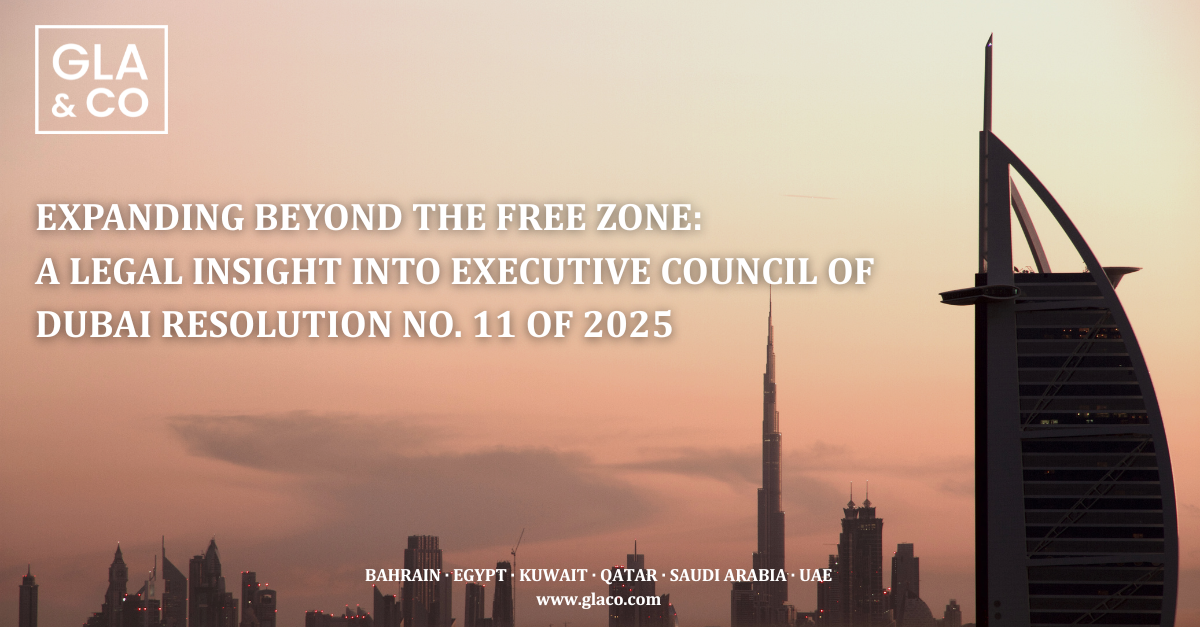
Expanding Beyond the Free Zone: A Legal Insight into Executive Council of Dubai Resolution No. 11 of 2025
The Executive Council of Dubai (the “Council”) issued Resolution no. 11 of 2025 (the “Resolution”), introducing a legal framework that permits Free Zone licensed entities to carry out business activities outside their respective Free Zones within the Emirate of Dubai. The Resolution, signed by H.H. Sheikh Hamdan bin Mohammed bin Rashid Al Maktoum, Crown Prince of Dubai and Chairman of the Council, the Resolution aims to harmonize Free Zones operations with the federal and local regimes in the UAE. The Resolution was published in the Official Gazette on 3 March 2025 and took immediate effect. Below are the key provisions of the Resolution.
Applicability
Under article 2 of the Resolution, the provisions apply to all Free Zone Establishments, being Companies or corporations licensed by a free zone authority to operate within Dubai, seeking to conduct business activities outside their designated Free Zone.
However, the resolution excludes financial institutions licensed under the Dubai International Financial Centre (“DIFC”) from the application of the provisions of the Resolution.
Key Requirements for Operating Outside Free Zones
As outlined in article 3, Free Zone Establishments that are willing to operate in Dubai must obtain a license or permit from the Department of Economy and Tourism (“DET”) per article 4 before conducting activities outside their Free Zone. They are also required to comply with all relevant federal and local Dubai laws governing their relevant activities. Additionally, companies must maintain separate financial records for mainland activities, distinguishing them from Free Zone operations. If an Establishment intends to operate beyond Dubai, it must secure approvals from the respective jurisdictions in accordance with the respective jurisdiction’s local laws.
Types of Licenses and Permits
Article 4 specifies that the DET may issue three types of authorizations: (i) license of a branch operating within Dubai, (ii) license of a branch operating out of the Free Zone, and (iii) permit to the Establishment to conduct specific activities within Dubai (per article 7 of the Resolution). The First two types of licenses are both valid for 1 year and renewable for the same period. The temporary permit under article 7 is valid for up to 6 months, enabling short-term operations outside the Free Zone.
Branch Licensing Conditions
Articles 5 and 6 detail the prerequisites for securing a branch licence. In that regard, Establishments must submit a formal application to the DET, accompanied by necessary documents. Approval must also be obtained from the licensing authority in the relevant Free Zone and any other relevant government entities overseeing the intended activity. The parent company’s Free Zone licence must remain valid throughout the process. It must be noted that the branches established under this Resolution do not have separate legal personality and shall remain legally tied to their respective parent company. Per article 12 of the Resolution, a license under articles 5 and 6 is subject to a fee of AED 10,000, paid annually upon issuance and renewal of such license.
Conditions for Temporary Activity Permits
For Free Zone Establishments requiring temporary mainland operations under article 7, such Establishments must submit an application with supporting documents, the Free zone licensing authority’s approval, along with any additional clearances from supervising entities. The permitted activities must align with the DET’s approved list of economic activities, and a fee of AED 5,000 applies per article 12.
Workforce Flexibility
Article 8 provides flexibility for licensed Establishments by allowing them to utilize their existing Free Zone-registered workforce for mainland operations. Importantly, employees retain all Free Zone employment privileges.
List of Approved Economic Activities
Article 9 mandates the DET, in coordination with the Free Zones licensing authorities, to publish a list of permissible economic activities within 6 months of the Resolution’s effective date. This list will determine whether a branch licence or temporary permit is needed for specific business activities.
Compliance Deadlines and Penalties
All Establishments currently operating outside Free Zones must comply with the new regulations within 1 year of the Resolution’s publication. The Director General of the DET may grant a 1-year extension if necessary.
Failure to adhere to these rules may result in administrative fine and penalties as stipulated under Article 10, which subjects violators to applicable administrative fines and measures under Dubai laws.
Conclusion
The Resolution introduces a structured approach for Free Zone entities to expand into mainland Dubai. By clarifying licensing requirements, compliance obligations, and workforce regulations, the resolution aims to foster economic growth while maintaining regulatory oversight. Companies operating under Free Zone licences should review their activities and ensure timely compliance with the new rules as other Emirates are anticipated to follow in Dubai’s steps with similar regimes.
How can we help?
GLA is delighted to assist the companies to obtain and maintain the licenses from the DET and advise Free Zone companies on compliance with the relevant policies and procedures.
Authors: Khaled Abu Orabi, Senior Associate and Khaled Al Khashab, Associate

